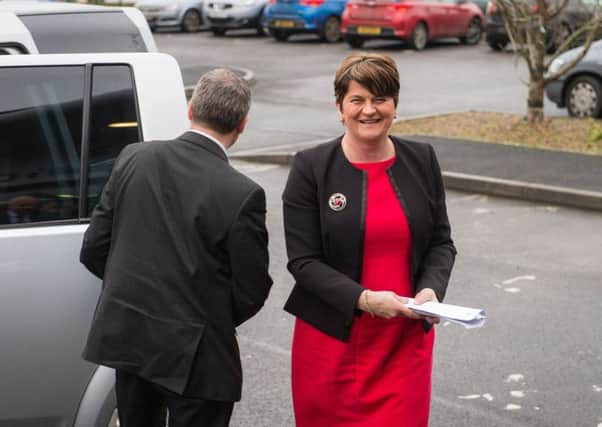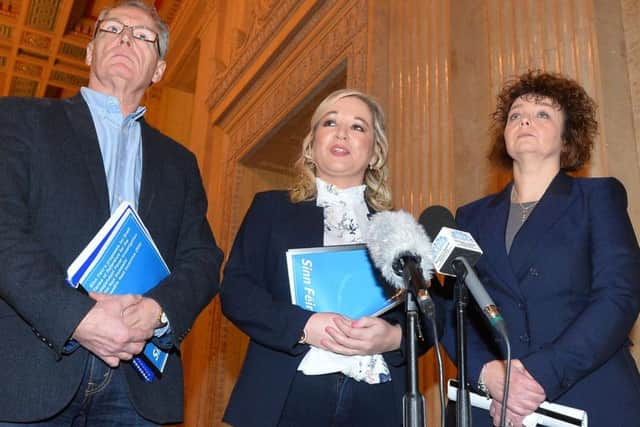DUP and SF move closer on inquiry, but not on Foster


After a week in which Sinn Fein wildly and uncharacteristically flip-flopped over whether to hold a full public inquiry into the scandal, the party published the terms of reference for its proposed more limited investigation into the affair.
Crucially, Sinn Fein’s proposals would involve legislation being fast-tracked through the Assembly – which would take at least 10 days – to give the inquiry powers to compel witnesses and documents.
Advertisement
Hide AdAdvertisement
Hide AdBut, it does not specify that evidence will be given under oath and does not say that evidence will be given in public, throwing up the possibility of a behind closed doors process.


Last night the First Minister, Arlene Foster, said that she accepted the proposed inquiry terms but rejected one key Sinn Fein demand which was repeated yesterday – that she stand aside for four months while a ‘preliminary report’ is conducted.
However, Sinn Fien insisted last night that “we have yet to be notified that our full Terms of Reference are agreed”. And the party repeated that it will not support any investigation that enables Mrs Foster to remain in post.
“It is clear there are many in the political class who do not believe in due process or natural justice,” said the DUP leader.
Advertisement
Hide AdAdvertisement
Hide Ad“They just want me to go regardless of the fact that there is not a scintilla of evidence of wrongdoing against me. I don’t roll over to my political opponents.


“I believe in getting to the truth. I believe in due process for everyone and that everyone is equal before the law and equally subject to the law. That has always been the cornerstone of who I am and will be so despite the hysteria.”
Earlier, the DUP leader, who has faced down a barrage of calls to step aside, posted a picture on Facebook of a guinea pig wearing a pair of pink love-heart shaped glasses below the phrase: “Can’t see all the haters when I’ve got my love glasses on.”
She has claimed many of the calls for her to quit are motivated by misogyny.
Advertisement
Hide AdAdvertisement
Hide AdSinn Fein Health Minister Michelle O’Neill said the key element of their proposals is the need to be able to compel witnesses and subpoena documents.
The scandal has erupted at a time when Sinn Fein Deputy First Minister Martin McGuinness has been experiencing serious – but as yet publicly unspecified – health problems.
Mrs O’Neill said her party colleague remained at the core of the party’s response to the RHI affair.
However, when asked about the absence of any commitment to either take evidence in public or under oath, Sinn Fein told the News Letter that both issues would be left up to the investigatory panel and the judge who oversees the process to decide. The party said that there would be no preclusion from it deciding to do so.
Advertisement
Hide AdAdvertisement
Hide AdIndependent Justice Minister Claire Sugden, who had only seen the Sinn Fein proposals not long before speaking to the News Letter, was also asked about the absence in the document of a mechanism for taking evidence under oath.
She said that she would need to read the proposals in more detail as it was not something she had thought about in detail.
When it was put to her that to date there have been seriously contradictory versions of what went on a key points during the debacle and that in order to get to the truth it would be necessary to have a sanction to ensure that those found to be lying face some sanction, she said: “Well yes, I suppose so. Yeah.”
But when asked if she was calling for such a provision, she said: “In terms of an oath, to be honest, if people are not going to be coming forward with the truth or deliberately withholding information, I think they would do that anyway.
Advertisement
Hide AdAdvertisement
Hide Ad“But if an oath is going to strengthen this type of investigation...to try to get to the bottom of RHI and find out the failings here, then I’m happy for anything that strengthens an investigation that will claw back public confidence”.
Ms Sugden also said that she felt that “Martin and Arlene have both let me down”.
The lack of consensus over the form of an investigation comes amid similar disagreement on DUP proposals to reduce the overspend. The DUP has claimed its proposals could wipe out the bill, but Sinn Fein have rubbished them.
Senior members of Sinn Fein have warned they will exercise their power to collapse the Executive if Mrs Foster does not temporarily stand down to facilitate an RHI probe.
Advertisement
Hide AdAdvertisement
Hide AdThe Justice Minister had not commented publicly on the RHI scandal for more than two weeks - prompting criticism from political rivals.
Breaking her recent silence, Ms Sugden said her job had become increasingly difficult.
But she told Radio Ulster she would not resign because she still felt she could help change people’s lives for the better in her role. She also stressed that her quitting would send the Executive down a “path of no return”.
The TUV leader Jim Allsiter questioned the efficacy of the Sinn Fein proposals for an inquiry.
Advertisement
Hide AdAdvertisement
Hide AdHe said: “A statutory public inquiry under the Inquiries Act 2005 automatically has the necessary powers to compel witnesses and documentation.
“A non-statutory inquiry has no powers unless such are given to it in any statute establishing it - but why would anyone want separate legislation when already on the shelf is the Inquiries Act with all the powers needed, including the power to take evidence on oath, and the protection of false evidence being perjury.
“A ‘Protocol on Full Disclosure’ is meaningless in comparison with the compellability powers of the 2005 Act.
“The default position under the Inquiries Act is all evidence is given in public, with witnesses cross-examined by counsel to the inquiry; the Sinn Fein proposal is devoid of all this.
Advertisement
Hide AdAdvertisement
Hide Ad“Their terms of reference also fail to adequately focus on the very important issue of the process and facts of how the RHI Scheme came to be approved.”
SDLP leader Column Eastwood said: “Sinn Féin are going to extreme efforts to avoid a public inquiry.”